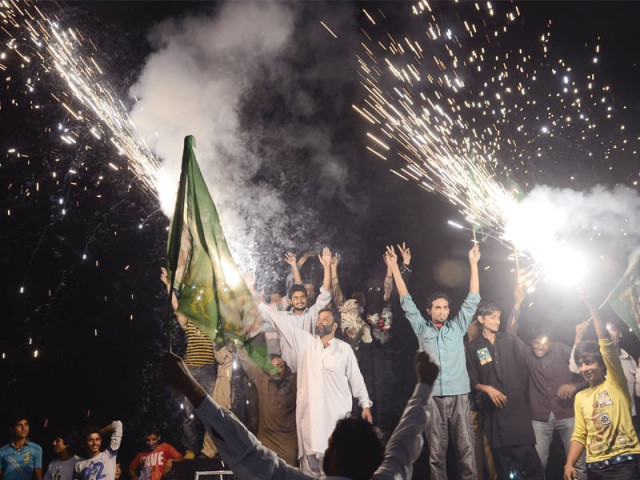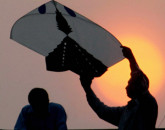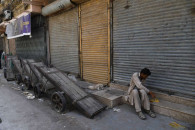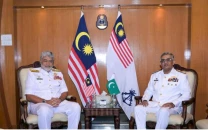Post 9/11 Pakistan: a huge challenge for Nawaz
Despite its victory in the centre and Punjab, the situation will still be tough for a PML-N government.

Supporters of Pakistan Muslim League-Nawaz celebrate with fireworks the victory of their party a day after landmark general elections, in Lahore. PHOTO: AFP
Prime minister-in-making Nawaz Sharif is set to start his innings from where he left it on October 12, 1999. But over the last 12 years, Imran Khan’s Pakistan Tehreek-e-Insaf has emerged as a new force against him, replacing the Pakistan Peoples Party, at least in Punjab and Khyber-Pakhtunkhwa.
Sharif faces far greater challenges today than those he faced during his last tenure as premier. Post-9/11 Pakistan is far more difficult to govern and the issue of terrorism was far easier to handle in 1997 than in 2013. There was no insurgency in Balochistan a decade ago and Karachi was not a volcano waiting to explode like it is today.
Despite its victory in the centre and Punjab, the situation will still be tough for a PML-N government. It is likely to encounter opposition from the governments in Sindh and K-P. With PPP still enjoying a majority in the Senate, Nawaz may also find it difficult to pass legislation in Parliament.
Although PTI could not perform well in Punjab as it did in K-P, those elected on its ticket from the former province are veteran politicians like Shah Mehmood Qureshi, Jehangir Tareen and Sheikh Rashid Ahmed, rather than youngsters.

The party’s success in K-P, meanwhile, was largely due its bold stance against US drone strikes in the tribal areas and the war on terror – issues which have marred both Awami National Party and PPP’s reputation in the province.
PTI should be satisfied with its performance in the 2013 elections and consider it a victory. The last time the party contested the polls in 2002, only Imran Khan managed to win a seat.
PPP last performed poorly in 1997, when it managed to win only 18 seats the National Assembly. Although the party bounced back in 2002, thanks to the charismatic presence of Benazir Bhutto, its mandate was hijacked by then president Pervez Musharraf, who formed the new PPP-Patriots. Following Benazir’s assassination in 2007, her husband Asif Ali Zardari emerged as party’s figurehead and saw it to victory in the 2008 elections.
PPP’s subsequent five-year term, however, has damaged the public’s perception of the party and diminished its vote-bank, particularly in South Punjab. Bad governance, allegations of corruption, infighting and its own decision to all but concede Punjab led to a complete washout in the 2013 polls. PPP may also find it difficult to bounce back since it lacks any charismatic leader this time around.
Published in The Express Tribune, May 13th, 2013.



















COMMENTS
Comments are moderated and generally will be posted if they are on-topic and not abusive.
For more information, please see our Comments FAQ